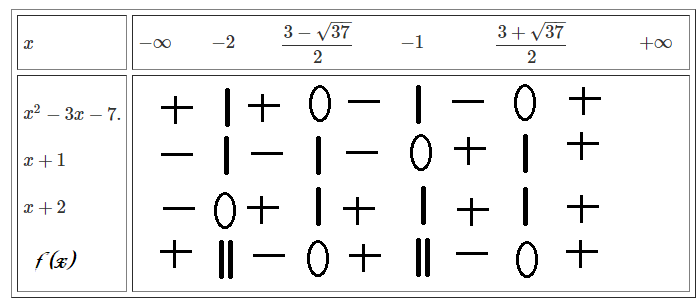Giải x
\(\dfrac{1}{3}x+\dfrac{4}{3}x=0\)
giải các phương trình sau
a, 3(x-1) -3=2(x+3)
b, \(\dfrac{x+4}{4}-\dfrac{x+3}{3}=\dfrac{x+6}{6}\)
c,\(\left(2x-1\right)^2-x^2=0\)
d,\(\dfrac{x}{x+3}-\dfrac{2x}{x-3}-\dfrac{3x}{9-x^2}=0\)
d: Ta có: \(\dfrac{x}{x+3}-\dfrac{2x}{x-3}-\dfrac{3x}{9-x^2}=0\)
\(\Leftrightarrow x^2-3x-2x^2-6x+3x=0\)
\(\Leftrightarrow-x^2-6x=0\)
\(\Leftrightarrow-x\left(x+6\right)=0\)
\(\Leftrightarrow\left[{}\begin{matrix}x=0\left(nhận\right)\\x=-6\left(nhận\right)\end{matrix}\right.\)
a: Ta có: \(3\left(x-1\right)-3=2\left(x+3\right)\)
\(\Leftrightarrow3x-3-3=2x+6\)
\(\Leftrightarrow x=12\)
b: Ta có: \(\dfrac{x+4}{4}-\dfrac{x+3}{3}=\dfrac{x+6}{6}\)
\(\Leftrightarrow3x+12-4x-12=2x+12\)
\(\Leftrightarrow-3x=12\)
hay x=-4
c: Ta có: \(\left(2x-1\right)^2-x^2=0\)
\(\Leftrightarrow\left(x-1\right)\left(3x-1\right)=0\)
\(\Leftrightarrow\left[{}\begin{matrix}x=1\\x=\dfrac{1}{3}\end{matrix}\right.\)
1) GIẢI phương trình :
a) 2x-6=0
b) x2-4x=0
c)\(\dfrac{x+2}{x-3}\)-\(\dfrac{3}{x}\)=\(\dfrac{x+9}{x^2-3x}\)
d) \(\dfrac{x-1}{2}\)-\(\dfrac{x-2}{3}\)=x-\(\dfrac{x-3}{4}\)
giải chi tiết giúp mik ah
a) \(2x-6=0\)
\(\Leftrightarrow2x=6\)
\(\Leftrightarrow x=\dfrac{6}{2}=3\)
b) \(x^2-4x=0\)
\(\Leftrightarrow x\left(x-4\right)=0\)
\(\Leftrightarrow\left\{{}\begin{matrix}x=0\\x-4=0\end{matrix}\right.\)
\(\Leftrightarrow\left\{{}\begin{matrix}x=0\\x=4\end{matrix}\right.\)
giải phương trình:
a) \(\left(\dfrac{x}{2}+1\right)^3-\dfrac{x^3}{2}-4=0\)
b) \(\dfrac{3-x}{2007}+1=\dfrac{2-x}{2008}-\dfrac{x}{2009}\)
Lời giải:
a)
PT \(\Leftrightarrow \frac{(x+2)^3}{8}-\frac{x^3+8}{2}=0\)
\(\Leftrightarrow (x+2)^3-4(x^3+8)=0\)
\(\Leftrightarrow (x+2)^3-4(x+2)(x^2-2x+4)=0\)
\(\Leftrightarrow (x+2)[(x+2)^2-4(x^2-2x+4)]=0\)
\(\Leftrightarrow (x+2)(-3x^2+12x-12)=0\)
\(\Leftrightarrow (x+2)(x^2-4x+4)=0\Leftrightarrow (x+2)(x-2)^2=0\Rightarrow x=\pm 2\)
b) Bạn kiểm tra lại xem có sai đề không?
Giải phương trình:
\(\dfrac{1}{x}+\dfrac{1}{x+1}+\dfrac{1}{x+2}+\dfrac{1}{x+3}+\dfrac{1}{x+4}=0\)
ĐKXĐ : \(x\notin\left\{0;-1;-2;-3;-4\right\}\)
Ta có \(\dfrac{1}{x}+\dfrac{1}{x+1}+\dfrac{1}{x+2}+\dfrac{1}{x+3}+\dfrac{1}{x+4}=0\)
\(\Leftrightarrow\dfrac{2x+4}{x.\left(x+4\right)}+\dfrac{2x+4}{\left(x+1\right).\left(x+3\right)}+\dfrac{1}{x+2}=0\)
\(\Leftrightarrow\dfrac{2x+4}{\left(x+2\right)^2-4}+\dfrac{2x+4}{\left(x+2\right)^2-1}+\dfrac{1}{x+2}=0\) (*)
Đặt x + 2 = a \(\left(a\ne0\right)\)
(*) \(\Leftrightarrow\dfrac{2a}{a^2-4}+\dfrac{2a}{a^2-1}+\dfrac{1}{a}=0\)
\(\Leftrightarrow\dfrac{2}{a-\dfrac{4}{a}}+\dfrac{2}{a-\dfrac{1}{a}}+\dfrac{1}{a}=0\) (**)
Đặt \(\dfrac{1}{a}=b\left(b\ne0\right)\) \(\Rightarrow ab=1\)
Ta được (**) \(\Leftrightarrow\dfrac{2}{a-4b}+\dfrac{2}{a-b}+b=0\)
\(\Leftrightarrow\dfrac{2b}{1-4b^2}+\dfrac{2b}{1-b^2}+b=0\)
\(\Leftrightarrow\dfrac{2}{1-4b^2}+\dfrac{2}{1-b^2}=-1\)
\(\Rightarrow4-10b^2=-4b^4+5b^2-1\)
\(\Leftrightarrow4b^4-15b^2+5=0\) (***)
Đặt b2 = t > 0
Ta có (***) <=> \(4t^2-15t+5=0\Leftrightarrow t=\dfrac{15\pm\sqrt{145}}{8}\) (tm)
\(\Leftrightarrow b=\pm\sqrt{\dfrac{15\pm\sqrt{145}}{8}}\)
mà x + 2 = a ; ab = 1
nên \(x=\pm\sqrt{\dfrac{8}{15\pm\sqrt{145}}}-2\)
Thử lại ta có phương trình có 4 nghiệm như trên
Giải các phương trình
1,\(3x-1=0\\\) 4, \(\dfrac{x}{3}-\dfrac{x}{5}=4\)
2, \(2-x=3x+1\) 5, \(\dfrac{x-1}{4}+\dfrac{2x+1}{6}=\dfrac{3}{2}\)
3, \(2\left(x-2\right)-1=5x\)
1,\(3x-1=0\Leftrightarrow3x=-1\Leftrightarrow x=-\dfrac{1}{3}\)
2,\(2-x=3x+1\Leftrightarrow2-1=3x+x\rightarrow1=4x\Rightarrow x=-\dfrac{1}{4}\)
3,\(2\left(x-2\right)-1=5x\Leftrightarrow2x-4-1=5x\Leftrightarrow2x-5x=4+1\Rightarrow3x=5\Rightarrow x=\dfrac{5}{3}\)
4,\(\dfrac{x}{3}-\dfrac{x}{5}=4\Leftrightarrow\dfrac{5x}{15}-\dfrac{3x}{15}=\dfrac{60}{15}\Rightarrow5x-3x=60\Rightarrow2x=60\Rightarrow x=\dfrac{60}{2}=30\)
5,\(\dfrac{x-1}{4}+\dfrac{2x+1}{6}=\dfrac{3}{2}\Leftrightarrow\dfrac{3\left(x-1\right)}{12}+\dfrac{2\left(2x+1\right)}{12}=\dfrac{18}{12}\)
\(3\left(x-1\right)+2\left(2x+1\right)=18\Leftrightarrow3x-3+4x+2=18\Leftrightarrow3x+4x=3-2+18\Rightarrow7x=19\Rightarrow x=\dfrac{19}{2}\)
Giải phương trình:
1. \(x^4-6x^2-12x-8=0\)
2. \(\dfrac{x}{2x^2+4x+1}+\dfrac{x}{2x^2-4x+1}=\dfrac{3}{5}\)
3. \(x^4-x^3-8x^2+9x-9+\left(x^2-x+1\right)\sqrt{x+9}=0\)
4. \(2x^2.\sqrt{-4x^4+4x^2+3}=4x^4+1\)
5. \(x^2+4x+3=\sqrt{\dfrac{x}{8}+\dfrac{1}{2}}\)
6. \(\left\{{}\begin{matrix}4x^3+xy^2=3x-y\\4xy+y^2=2\end{matrix}\right.\)
7. \(\left\{{}\begin{matrix}\sqrt{x^2-3y}\left(2x+y+1\right)+2x+y-5=0\\5x^2+y^2+4xy-3y-5=0\end{matrix}\right.\)
8. \(\left\{{}\begin{matrix}\sqrt{2x^2+2}+\left(x^2+1\right)^2+2y-10=0\\\left(x^2+1\right)^2+x^2y\left(y-4\right)=0\end{matrix}\right.\)
1.
\(x^4-6x^2-12x-8=0\)
\(\Leftrightarrow x^4-2x^2+1-4x^2-12x-9=0\)
\(\Leftrightarrow\left(x^2-1\right)^2=\left(2x+3\right)^2\)
\(\Leftrightarrow\left[{}\begin{matrix}x^2-1=2x+3\\x^2-1=-2x-3\end{matrix}\right.\)
\(\Leftrightarrow\left[{}\begin{matrix}x^2-2x-4=0\\x^2+2x+2=0\end{matrix}\right.\)
\(\Leftrightarrow x=1\pm\sqrt{5}\)
3.
ĐK: \(x\ge-9\)
\(x^4-x^3-8x^2+9x-9+\left(x^2-x+1\right)\sqrt{x+9}=0\)
\(\Leftrightarrow\left(x^2-x+1\right)\left(\sqrt{x+9}+x^2-9\right)=0\)
\(\Leftrightarrow\sqrt{x+9}+x^2-9=0\left(1\right)\)
Đặt \(\sqrt{x+9}=t\left(t\ge0\right)\Rightarrow9=t^2-x\)
\(\left(1\right)\Leftrightarrow t+x^2+x-t^2=0\)
\(\Leftrightarrow\left(x+t\right)\left(x-t+1\right)=0\)
\(\Leftrightarrow\left[{}\begin{matrix}x=-t\\x=t-1\end{matrix}\right.\)
\(\Leftrightarrow\left[{}\begin{matrix}x=-\sqrt{x+9}\\x=\sqrt{x+9}-1\end{matrix}\right.\)
\(\Leftrightarrow...\)
2.
ĐK: \(x\ne\dfrac{2\pm\sqrt{2}}{2};x\ne\dfrac{-2\pm\sqrt{2}}{2}\)
\(\dfrac{x}{2x^2+4x+1}+\dfrac{x}{2x^2-4x+1}=\dfrac{3}{5}\)
\(\Leftrightarrow\dfrac{1}{2x+\dfrac{1}{x}+4}+\dfrac{1}{2x+\dfrac{1}{x}-4}=\dfrac{3}{5}\)
Đặt \(2x+\dfrac{1}{x}+4=a;2x+\dfrac{1}{x}-4=b\left(a,b\ne0\right)\)
\(pt\Leftrightarrow\dfrac{1}{a}+\dfrac{1}{b}=\dfrac{3}{5}\left(1\right)\)
Lại có \(a-b=8\Rightarrow a=b+8\), khi đó:
\(\left(1\right)\Leftrightarrow\dfrac{1}{b+8}+\dfrac{1}{b}=\dfrac{3}{5}\)
\(\Leftrightarrow\dfrac{2b+8}{\left(b+8\right)b}=\dfrac{3}{5}\)
\(\Leftrightarrow10b+40=3\left(b+8\right)b\)
\(\Leftrightarrow\left[{}\begin{matrix}b=2\\b=-\dfrac{20}{3}\end{matrix}\right.\)
TH1: \(b=2\Leftrightarrow...\)
TH2: \(b=-\dfrac{20}{3}\Leftrightarrow...\)
giải các phương trình sau
a, 3x -(3x+2) =x+3
b, \(\dfrac{5x-1}{4}+\dfrac{2x-1}{3}=\dfrac{3x}{2}\)
c, \(\left(x^2-3^2\right)+2\left(x-3\right)=0\)
d,\(\dfrac{1}{x-1}+\dfrac{2}{1+x}-\dfrac{4x+6}{x^2-1}=0\)
a: Ta có: \(3x-\left(3x+2\right)=x+3\)
\(\Leftrightarrow x+3=-2\)
hay x=-5
b: Ta có: \(\dfrac{5x-1}{4}+\dfrac{2x-1}{3}=\dfrac{3x}{2}\)
\(\Leftrightarrow15x-3+8x-4=18x\)
\(\Leftrightarrow5x=7\)
hay \(x=\dfrac{7}{5}\)
Giải các bất phương trình sau
1) \(\dfrac{\text{x - 2}}{x+1}-\dfrac{3}{x+2}>0\) 2) \(\dfrac{\text{x + 1}}{x+2}+\dfrac{x}{x-3}\le0\)
3) \(\dfrac{\text{x}^2+2x+5}{x+4}>x-3\) 4) \(\sqrt{\text{x^2}-3x+2}\ge3\)
\(\dfrac{x-2}{x+1}-\dfrac{3}{x+2}>0.\left(x\ne-1;-2\right).\\ \Leftrightarrow\dfrac{x^2-4-3x-3}{\left(x+1\right)\left(x+2\right)}>0.\\ \Leftrightarrow\dfrac{x^2-3x-7}{\left(x+1\right)\left(x+2\right)}>0.\)
Đặt \(f\left(x\right)=\dfrac{x^2-3x-7}{\left(x+1\right)\left(x+2\right)}>0.\)
Ta có: \(x^2-3x-7=0.\Rightarrow\left[{}\begin{matrix}x=\dfrac{3+\sqrt{37}}{2}.\\x=\dfrac{3-\sqrt{37}}{2}.\end{matrix}\right.\)
\(x+1=0.\Leftrightarrow x=-1.\\ x+2=0.\Leftrightarrow x=-2.\)
Bảng xét dấu:

\(\Rightarrow f\left(x\right)>0\Leftrightarrow x\in\left(-\infty-2\right)\cup\left(\dfrac{3-\sqrt{37}}{2};-1\right)\cup\left(\dfrac{3+\sqrt{37}}{2};+\infty\right).\)
\(\sqrt{x^2-3x+2}\ge3.\\ \Leftrightarrow x^2-3x+2\ge9.\\ \Leftrightarrow x^2-3x-7\ge0.\)
\(\Rightarrow\left[{}\begin{matrix}x=\dfrac{3-\sqrt{37}}{2}.\\x=\dfrac{3+\sqrt{37}}{2}.\end{matrix}\right.\)
Đặt \(f\left(x\right)=x^2-3x-7.\)
\(f\left(x\right)=x^2-3x-7.\)
\(\Rightarrow f\left(x\right)\ge0\Leftrightarrow x\in(-\infty;\dfrac{3-\sqrt{37}}{2}]\cup[\dfrac{3+\sqrt{37}}{2};+\infty).\)
\(\Rightarrow\sqrt{x^2-3x+2}\ge3\Leftrightarrow x\in(-\infty;\dfrac{3-\sqrt{37}}{2}]\cup[\dfrac{3+\sqrt{37}}{2};+\infty).\)
giải phương trình sau
\(a,\dfrac{4x-17}{2x^2+1}=0\\ b,\dfrac{4}{x-2}-x+2=0\\ c,x+\dfrac{1}{x}=x^2+\dfrac{1}{x^2}\\ d,\dfrac{x-3}{x-2}-\dfrac{x-2}{x-4}=3^1_5\)
a) \(\dfrac{4x-17}{2x^2+1}=0\) ( 1)
ĐKXĐ : \(2x^2+1\ne0\)
⇔ x2 \(\ne\dfrac{-1}{2}\) ( luôn đúng )
( 1) ⇔ 4x - 17 = 0
⇔ x = \(\dfrac{17}{4}\)
KL....
b) \(\dfrac{4}{x-2}-x+2=0\)
⇔ \(\dfrac{4-\left(x-2\right)^2}{x-2}=0\left(x\ne2\right)\)
⇔ 4 - ( x2 - 4x + 4) = 0
⇔ 4x - x2 = 0
⇔ x( 4 - x) = 0
⇔ x = 0 ( TM) hoặc x = 4 ( TM)
KL...
c) x + \(\dfrac{1}{x}=x^2+\dfrac{1}{x^2}\left(x\ne0\right)\)
Đặt : x + \(\dfrac{1}{x}=t\) ⇒ \(x^2+\dfrac{1}{x^2}=t-2\) , ta có :
t = t - 2 ( Vô lý )
⇒ t ∈ ∅
⇒ Phương trình vô nghiệm
d) \(\dfrac{x-3}{x-2}-\dfrac{x-2}{x-4}=3\dfrac{1}{5}\left(x\ne2;x\ne4\right)\)
⇔ ( x - 3)( x - 4) - ( x - 2)2 = \(\dfrac{16}{5}\)( x - 2)( x - 4)
⇔ x2 - 7x + 12 - x2 + 4x - 4 = \(\dfrac{16}{5}\)( x2 - 6x + 8)
⇔ \(\dfrac{40-15x}{5}=\dfrac{16x^2-96x+128}{5}\)
giải nốt nha
Mạn phép ko chép lại đề mk làm lại câu c
Đặt : t = x + \(\dfrac{1}{x}\) ⇒ t2 - 2 = x2 + \(\dfrac{1}{x^2}\) , ta có :
t = t2 - 2
⇔ t2 - t - 2 = 0
⇔ t2 + t - 2t - 2 = 0
⇔ t( t + 1) - 2( t + 1) = 0
⇔ ( t + 1)( t - 2) = 0
⇔ t = 2 hoặc t = -1
* Với t = 2 ,ta có :
x + \(\dfrac{1}{x}=2\)
Tự giải ra nha
* Với t = -1 , ta có :
x + \(\dfrac{1}{x}=-1\)
Tự giải ra nha
Giải pt sau
\(\left(\dfrac{x-1}{x+2}\right)^2-\left(\dfrac{2x+4}{x-3}\right)^2+3\left(\dfrac{x-1}{x-3}\right)=0\)
ĐKXĐ: ...
\(\left(\dfrac{x-1}{x+2}\right)^2-4\left(\dfrac{x+2}{x-3}\right)^2+3\left(\dfrac{x-1}{x-3}\right)=0\)
Đặt \(\left\{{}\begin{matrix}\dfrac{x-1}{x+2}=a\\\dfrac{x+2}{x-3}=b\end{matrix}\right.\)
\(\Rightarrow a^2-4b^2+3ab=0\Leftrightarrow\left(a-b\right)\left(a+4b\right)=0\)
\(\Leftrightarrow\left[{}\begin{matrix}a-b=0\\a+4b=0\end{matrix}\right.\) \(\Leftrightarrow\left[{}\begin{matrix}\dfrac{x-1}{x+2}-\dfrac{x+2}{x-3}=0\\\dfrac{x-1}{x+2}+\dfrac{4x+8}{x-3}=0\end{matrix}\right.\)
\(\Leftrightarrow\left[{}\begin{matrix}\left(x-1\right)\left(x-3\right)-\left(x+2\right)^2=0\\\left(x-\right)\left(x-3\right)+4\left(x+2\right)^2=0\end{matrix}\right.\)
\(\Leftrightarrow...\)